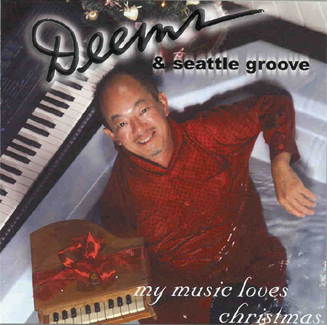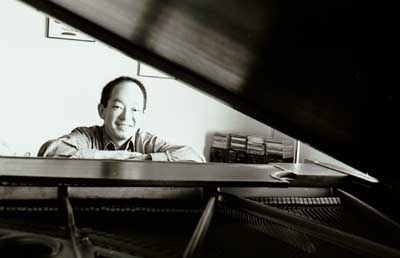From International Examiner, February 2001
Cruising with Deems
Seattle's local pianist talks about the music and the groove
by thomas ohaus
We caught up with J-Town recording artist Deems at the always busy, South
China Restaurant / Bar to talk about music and the release of his latest CD
Love West. Here we vouch for the combination of good food,
conversation, music and drink as antidotes to the everyday ass-whippings
life subjects us to.
TO: How do you think the music industry has changed in the last ten
years or so?
Deems: It seems music has become Balkanized for marketing reasons. Every
genre has sub genres and even the subs have subs. The categorizing of
musical taste into more minute market segments shows the industry doesn't
trust the listeners to handle the broad categories of jazz, R&B, country,
rock, or classical on the same station much less in the same hour. So the
segmentation has changed the market, which has changed the way listeners
approach music.
It's like asking a person to pick a visual art to define himself. Are you
an impressionist, abstract expressionist, or pop-art kind of viewer? It
doesn't make much sense. We have favorite works, but most of us are open to
all styles in the visual arts so why not in music?
TO: You've played music based on the blues, jazz, R&B and funk
for over 30 years and now you seemed to have found yourself in this Smooth
Jazz genre. How do you view this genre?
Deems: As you said, my musical influences come from the whole gamut of
the blues, jazz and R&B sounds of the inner city. Of course like everyone
else, rock and pop was also part of that experience. There is a certain
amount of commercial success and notoriety I have now because there is a
category to define some of what I've always played, fusing all these
influences. When Grover Washington, Jr. came out with "Mr. Magic" there was
no such category as Smooth Jazz. It was just one of many sounds on the scene
along with George Benson, Al Jarreau or artists from the CTI label. Now 20
years later Mr. Magic is in heavy rotation on smooth jazz stations across
the country.
TO: How does the genre affect your music?
Deems: I don't see the genre affecting the kind of music I make as much
as it gives me access to a larger audience. But it's a double-edge sword
situation. Smooth Jazz, like any other music or creative art form, has its
business side. Sometimes those concerns have a limiting factor, working
against air-play of music that doesn't fit the mode of what the controlling
media or consultants think is the commercially viable sound. It's great that
Grover or George Benson can remain popular with their older hits, but not
much else of their earlier, harder edge stuff gets played on even R&B or
jazz stations because they got pegged into one category. People don't seem
to have time for their history or changes.
TO: You get the same treatment with your "Tough Tofu." Will we
be able to hear cuts from "Love West" as well as your later releases on our
local smooth jazz station?
Deems: I've been fortunate to still get radio play from that older
release here in Seattle, nationally and in Europe as well, but it's still
difficult to get new or different sounding works on the air. Local station
personnel are generally supportive, but again they may be strapped by
corporate views on play lists. Which is why a large portion of my time is no
spent on promotion.
TO: Used to be a time in Seattle when local music entertainers
like yourself, Dee Daniels, Primo Kim or Walt Wagner had a nourishing,
supportive night club scene to move around int.
Deems: A lot has changed with the growth of Seattle, the age
demographics, and the explosive influence of television and video on the
lives of the music audience. The club scene has changed to reflect life
style trends and younger flavors. We're all still playing gigs around town
and Dee Daniels is singing in Vancouver and in Europe, but getting noticed
amidst the hustle and flash of heavily promoted acts in all the genres from
big record companies is extremely tough.
But even younger audiences are finding out it's possible to listen to 10
version of "Someone to Watch Over Me" and find something exciting in each
one. Then they open up to newer sounds in the same vein. That explains the
resurgent interest in Swing, Sinatra and Tony Bennett. There is definitely
an appreciation for stylistic and personality differences here, but again
the venues are limited. By the way, check out Primo's CD of "To Be Near,"
release in 1997. He has some tasty vocal interpretations going on.
TO: Recording and having your music in demand on the airwaves
is great, but obviously it's important to play the live gigs, to stretch out
and engage the audience and demonstrate the energy and personality of your
music. Do you have plans or events to promote "Love West" in live
performances?
Deems: My web site, www.deemsmusic.com, carries a schedule of events and
performances coming up in the next few months.
TO: From the opening cut on "Love West," "Early a.m." you're
evoking a cool serenity. You've always had that positive energy, looking
ahead and beyond barriers that could limit your music or career.
Deems: Yeah, that melody came to me waking up one morning and just being
thankful for what we all have here. Like most artists, I want to have a
positive influence on the cultural part I engage in. That's also why I wrote
"City of Hope." I like the idea of being out in this corner of the country,
not confined or burdened by the musical legacy of say, New Orleans jazz, of
Chicago blues. We can take all these musical influences and create something
very personal. It's a big part of why a Jimi Hendrix, a Quincy Jones, a
Kenny G or Pearl Jam was possible. In Seattle, we still have opportunities
to create something different out of our social and cultural milieu. But if
we're not careful, it could slip away as we homogenize with the rest of the
country.
TO: Describe the cut from the CD, "Rainier Ave. South."
Deems: With Light Rail planned down Rainer Avenue and high-tech at
Dearborn, some of the funk is definitely going out of that main drag. Before
all that happens, this "Rainier Ave. South" was to capture the images, the
feeling of that street we grew up on. Not as a thoroughfare to get to work,
but as a cruising boulevard, taking in all the neighborhoods from the ID
down to Renton. Also, the image of that "Mountain" on a clear crisp day has
been there from the get-go and will still be there long after light rail is
gone. I wanted to evoke that for all of us who are too old to cruise with a
posse down Sir Mix-a-Lot's "Broadway." Check out Rainier Avenue, alone or
with a "significant other" on a clear Sunday afternoon or a hot Saturday
night. This street, like Siddartha's river of life, is a visceral experience
that can be transcending, even at the intersection messes of Jackson and
Boren, 23rd or Othello.
TO: You sound like a romantic and an optimist.
Deems: Yeah, I'll cop to both those descriptions I've been fortunate.
People and events in my life have given me a world-view that can include all
that, as well as the blues. They are also two major sounds in all of DSG
releases. If a situation or partner seems to perfectly fit your life, then
you want to the music to flow in a groove, like the cuts "Love West" or
"Love Chill." Sometimes it doesn't happen often enough in our lives, so
people get cynical and jaded. They start to think that live is only for the
young and naïve or the rich and privileged, both with the time to indulge
and entertain us with their lives. I choose to indulge myself with those
themes in my music though I'm neither young nor rich.
Hopefully my own musical statements remind people that it doesn't all
have to be nostalgia for the cutting edge music of 40 years ago, or the
relentless rotation of commercial radio to feel that groove.
TO: With Seattle Groove you promote the city as well as
yourself. Why this tack?
Deems: Seattle, with all the dot.com and technology influence, currently
epitomizes the life style promoted by smooth jazz. But there is an irony in
the success of our city's life. In this book "Faster: The acceleration of
Just About Everything" James Gleick describes the "hurry" effect of
technology on society. People feel they are in danger of being left behind,
so they jump on this ever-accelerating train, continuously bombarded with
commercial sensations, that like politics, competes for our hears and minds
as well as our money. Music is just one of these sensations and sometimes
making choices seems like just one more hassle, when all we're just looking
for are moments of respite. The ability for smooth jazz to fulfill that role
is a large part of its appeal.
TO: You still write 90 percent of the music that you play, but
have branched off into producing other acts. Are there other directions in
music for you?
Deems: I'm having fun now and I enjoy the challenges of producing other
acts as well as directing my own career. I'm always open to musical changes
and challenges, which may not always be reflected in my commercial ventures.
I'd like to se how my musical writing and theater would go together. I'd
also like to imprint my style on a set of jazz standards. Whatever direction
it takes, the goal is always to connect emotionally with the audience, to
product a groove, a positive state, that cannot be denied, unless of course
you're full of yourself. In that case - "Tough Tofu." |
![]()

 This
week on KCTS Connects we feature the music of jazz pianist Deems
Tsutakawa who is accompanied on vibraphone by Kevin Boyd. A native of
Seattle, Deems is the son of artist, George Tsutakawa. Deems began playing
piano at the age of five and at the age of nine was chosen winner of the
Washington State Music Teachers Association's Annual Award. He originally
played classical music but in high school turned his attention to jazz. He
started his own label, J-Town Records in 1982. His first release, DEEMS,
was selected by nationally renowned jazz educator, Dr. Herbert Wong, as a
top 20 "Vital Jazz Vinyl."
This
week on KCTS Connects we feature the music of jazz pianist Deems
Tsutakawa who is accompanied on vibraphone by Kevin Boyd. A native of
Seattle, Deems is the son of artist, George Tsutakawa. Deems began playing
piano at the age of five and at the age of nine was chosen winner of the
Washington State Music Teachers Association's Annual Award. He originally
played classical music but in high school turned his attention to jazz. He
started his own label, J-Town Records in 1982. His first release, DEEMS,
was selected by nationally renowned jazz educator, Dr. Herbert Wong, as a
top 20 "Vital Jazz Vinyl."